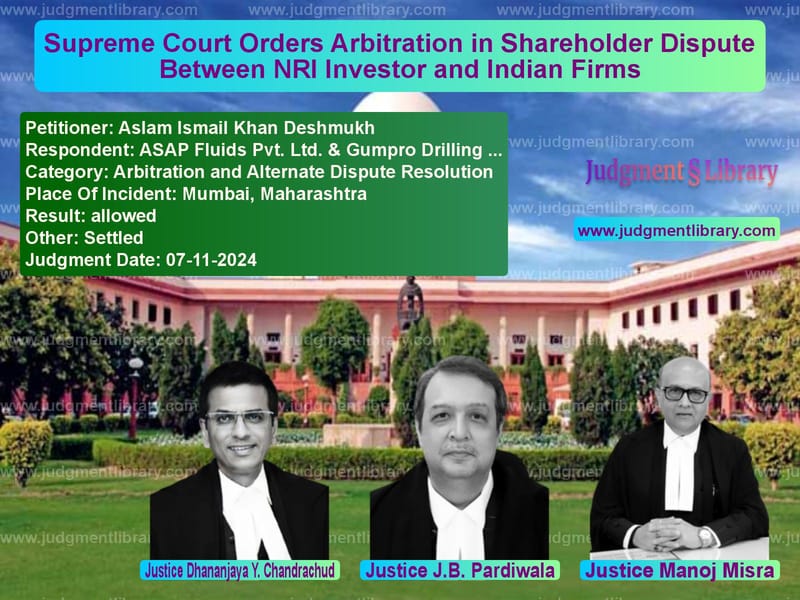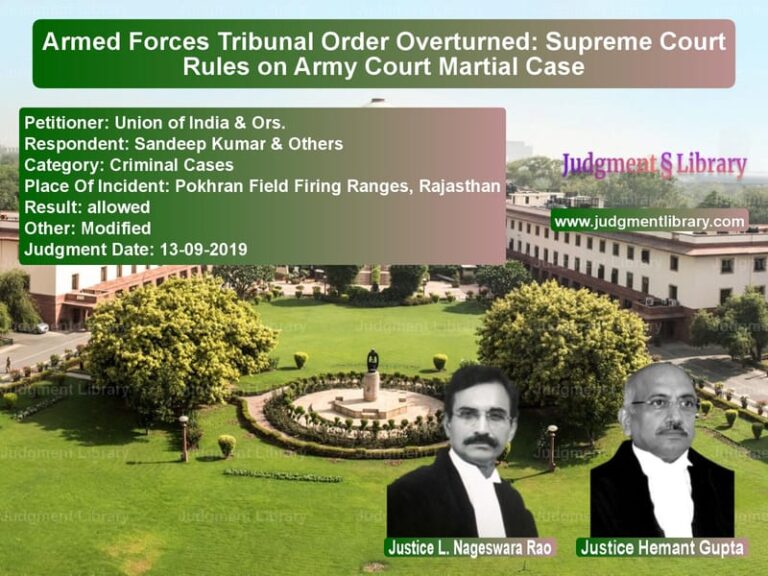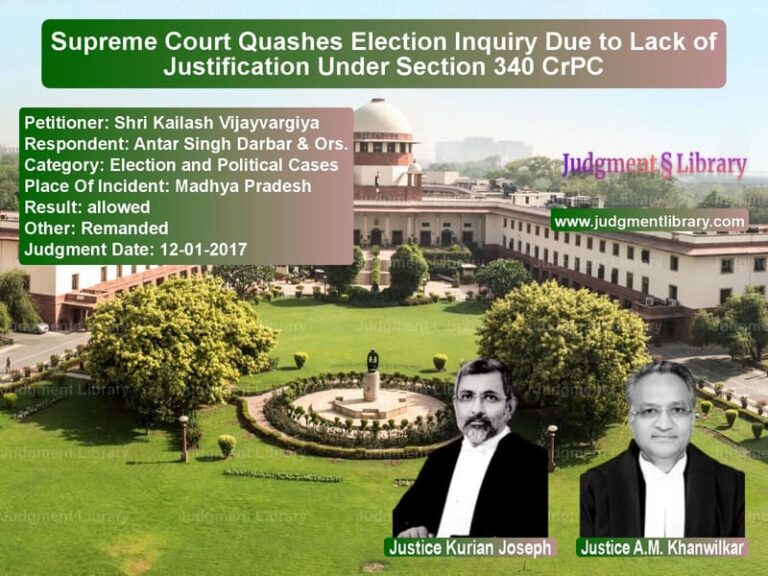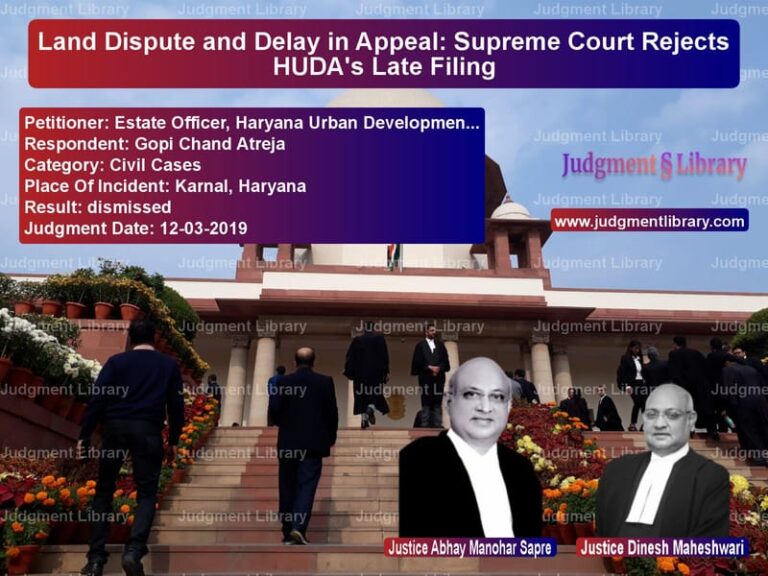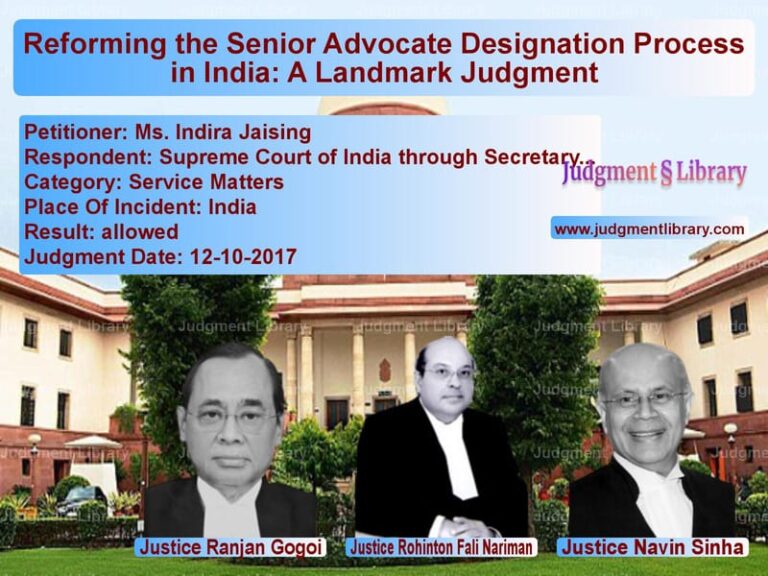Supreme Court Orders Arbitration in Shareholder Dispute Between NRI Investor and Indian Firms
The Supreme Court of India recently delivered a crucial judgment in the case of Aslam Ismail Khan Deshmukh v. ASAP Fluids Pvt. Ltd. & Anr., addressing a dispute over shareholding rights and arbitration clauses in a corporate agreement. The ruling reinforces the principle that arbitration agreements must be honored and that disputes arising under such agreements should be adjudicated by an arbitral tribunal rather than courts.
Background of the Case
The dispute revolves around a Shareholders Agreement dated July 25, 2011, entered between Aslam Ismail Khan Deshmukh (the petitioner), ASAP Fluids Pvt. Ltd. (respondent no.1), and Gumpro Drilling Fluids Pvt. Ltd. (respondent no.2), among others. The agreement detailed the allocation and rights associated with shares in respondent no.1.
As per the agreement, the petitioner was to hold 400,000 equity shares in respondent no.1 and actively participate in its management. However, a dispute arose when the petitioner alleged that despite being entitled to these shares, the company failed to issue the corresponding share certificates. Additionally, respondent no.2 allegedly withheld 200,010 shares that belonged to the petitioner, claiming that they were being held in trust for investor assurance.
The petitioner sought arbitration under Clause 13.10 of the Shareholders Agreement, which provided for dispute resolution through arbitration in Mumbai. However, after the respondents failed to respond to the arbitration notice, the petitioner approached the High Court of Bombay under Section 11(6) of the Arbitration and Conciliation Act, 1996, for the appointment of an arbitrator. The High Court dismissed the petition on procedural grounds, prompting the petitioner to file the current appeal before the Supreme Court.
Supreme Court’s Observations
The Supreme Court examined several key issues in the case, including the maintainability of the arbitration petition, the limitation period for raising claims, and the enforceability of the arbitration clause.
The key observations of the Supreme Court were:
- The arbitration agreement in Clause 13.10 of the Shareholders Agreement is valid and binding, and disputes arising from the agreement should be resolved through arbitration.
- The petitioner had issued a notice invoking arbitration on January 23, 2017, which was delivered to the respondents on January 24, 2017. Since the respondents failed to reply within the required 30-day period, the cause of action for arbitration was established.
- Despite arguments from the respondents that the claims were time-barred, the Court held that the issue of limitation should be determined by the arbitral tribunal rather than at the Section 11(6) stage.
- The Supreme Court reaffirmed the principle laid down in Vidya Drolia v. Durga Trading Corporation (2021) that courts should refer cases to arbitration unless it is “manifest and ex facie certain” that the claims are time-barred or non-arbitrable.
Key Arguments by the Parties
Petitioner’s Arguments (Aslam Ismail Khan Deshmukh):
- The Shareholders Agreement explicitly grants him 400,000 equity shares in respondent no.1, and respondent no.2 acknowledged holding 200,010 shares on his behalf.
- The respondents failed to issue share certificates despite multiple requests, thereby violating the terms of the agreement.
- The arbitration clause mandates that all disputes arising under the agreement be resolved through arbitration, making the case suitable for reference to an arbitral tribunal.
- The question of limitation should be determined by the arbitrator, as there is a continuing cause of action due to the respondents’ failure to issue the shares.
Respondents’ Arguments (ASAP Fluids Pvt. Ltd. & Gumpro Drilling Fluids Pvt. Ltd.):
- The petitioner failed to comply with the three-year “lock-in” period, as he resigned from respondent no.1 before completing the required term.
- Since the petitioner breached the agreement by resigning early, he forfeited his right to the shares.
- The arbitration claims were filed beyond the limitation period and should be dismissed as time-barred.
- The petitioner cannot claim arbitration under the Shareholders Agreement for disputes concerning the 200,010 shares, as they were not directly covered under the arbitration clause.
Supreme Court’s Final Judgment
The Supreme Court allowed the arbitration petitions, holding that:
- The arbitration clause in the Shareholders Agreement is valid and enforceable.
- The issue of limitation should be decided by the arbitral tribunal, not the courts at the Section 11(6) stage.
- The dispute, including issues regarding the petitioner’s entitlement to shares, falls within the scope of the arbitration agreement.
- A sole arbitrator, Mr. Mayur Khandeparkar, Advocate at the Bombay High Court, was appointed to resolve the dispute.
- The tribunal would have the authority to determine whether the claims were time-barred and assess costs accordingly.
Impact and Significance
This ruling strengthens the principle that arbitration agreements must be honored, limiting judicial interference at the appointment stage. It also reinforces the role of arbitral tribunals in deciding contentious issues such as limitation and contractual breaches.
Read also: https://judgmentlibrary.com/supreme-court-rules-on-arbitration-clause-in-public-premises-dispute/
The decision has significant implications for corporate and commercial disputes in India, particularly concerning shareholder agreements and investor rights. It ensures that companies and investors adhere to contractual dispute resolution mechanisms and prevents unnecessary litigation in courts.
Conclusion
The Supreme Court’s judgment in this case reaffirms India’s pro-arbitration stance and emphasizes that disputes arising under valid arbitration agreements should be resolved through arbitration. By directing the dispute to an arbitral tribunal, the ruling safeguards the integrity of contractual agreements and ensures that parties do not circumvent arbitration through procedural objections.
Petitioner Name: Aslam Ismail Khan Deshmukh.Respondent Name: ASAP Fluids Pvt. Ltd. & Gumpro Drilling Fluids Pvt. Ltd..Judgment By: Justice Dhananjaya Y. Chandrachud, Justice J.B. Pardiwala, Justice Manoj Misra.Place Of Incident: Mumbai, Maharashtra.Judgment Date: 07-11-2024.
Don’t miss out on the full details! Download the complete judgment in PDF format below and gain valuable insights instantly!
Download Judgment: aslam-ismail-khan-de-vs-asap-fluids-pvt.-ltd-supreme-court-of-india-judgment-dated-07-11-2024.pdf
Directly Download Judgment: Directly download this Judgment
See all petitions in Arbitration Awards
See all petitions in Enforcement of Awards
See all petitions in Commercial Arbitration
See all petitions in International Arbitration
See all petitions in Dispute Resolution Mechanisms
See all petitions in Judgment by Dhananjaya Y Chandrachud
See all petitions in Judgment by J.B. Pardiwala
See all petitions in Judgment by Manoj Misra
See all petitions in allowed
See all petitions in settled
See all petitions in supreme court of India judgments November 2024
See all petitions in 2024 judgments
See all posts in Arbitration and Alternate Dispute Resolution Category
See all allowed petitions in Arbitration and Alternate Dispute Resolution Category
See all Dismissed petitions in Arbitration and Alternate Dispute Resolution Category
See all partially allowed petitions in Arbitration and Alternate Dispute Resolution Category

